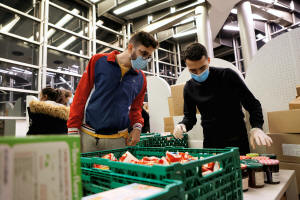|
Irfaq arrived in France in October to complete her business
studies degree and had expected to work part-time jobs to
supplement the 700 euros a month her father gives her.
But she said the coronavirus crisis meant there were few jobs
going, with bars and restaurants closed and businesses feeling
the pinch from COVID-19 restrictions.
"If I had work I wouldn't need the (handouts)," she said as she
volunteered for the charity Les Restos du Coeur (Restaurants of
the Heart).
In her parcel there is rice, pasta, dairy products, fruit,
vegetables and some meat. Once a month, shampoo and sanitary
products are added.
Students around the world have been hit by a lack of the
part-time jobs, including as baristas, waiters and shop workers,
many rely on to pay tuition fees, rent and living expenses.
The half-dozen charities distributing food in Paris say the
number of students seeking help has jumped since the government
put France back under lockdown and then a nightly curfew late
last year. Tens of thousands of food parcels are handed out each
week in the greater Paris region alone and it is a similar
situation elsewhere, they say.
The government has extended a publicly-funded scheme providing
one-euro meals to those on grants and made it available to all
students.
Irfaq said she arrived in Paris dreaming of enriching encounters
in one of the world's most beautiful cities. Instead she has
been left following lectures online from the confines of her
small room.
"To be honest, during the whole week, I'm just waiting for
Tuesday to come around. It changes my routine a bit," she said.
The combination of remote-learning and curfew, which runs from 6
p.m. to 6 a.m., was taking a heavy toll on the mental well-being
of her and her friends, Irfaq said.
Three in every four French students felt alone some or all of
the time, one opinion poll showed last month.
Students have protested against a government they say has
abandoned them. Government spokesman Gabriel Attal this week
said the poorest students had received emergency grants, money
had been released for psychological counselling and the
president wanted all students to be able to attend lectures in
person one day a week.
Irfaq said the COVID-19 crisis had sapped her of energy and
motivation.
"Now, when I see my friends, they are depressed and feel
lonely," she said. "Even when we are together, we feel lonely
and anxious."
(Reporting by Manuel Ausloos; Writing by Richard Lough; Editing
by Janet Lawrence)
[© 2021 Thomson Reuters. All rights
reserved.] Copyright 2021 Reuters. All rights reserved. This material may not be published,
broadcast, rewritten or redistributed.
Thompson Reuters is solely responsible for this content.

|
|




